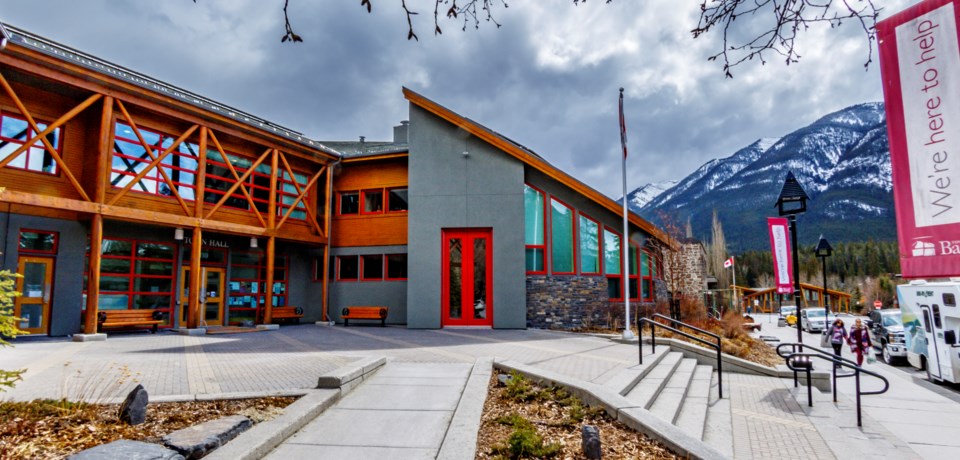BANFF – Several town councillors seem keen to drive down the proposed 4.67 per cent municipal tax decrease for 2021 even further as the community continues to deal with the financial fallout of the COVID-19 pandemic.
At a review of municipal services and budgets during a governance and finance committee meeting Monday (Jan. 18), councillors pitched different ideas, from cutting programs and services to re-looking at stretching out capital reserve contributions.
Mayor Karen Sorensen said the budget is challenging given the ongoing COVID-19 pandemic, noting there has never been a time in the municipality’s history when so little is known about what the next one to three years hold.
“Budgets are this organization’s best educated guess on what the services required and desired are, and what the revenues and costs associated with those services will be,” she said.
“This council understands the need for nimbleness and the real possibility of having to reopen a budget in the middle of the year to adjust as required, which is what we did in 2020.”
In terms of an overall municipal tax requisition, administration is using 2019 as a base year due to COVID-19 and applying a 1.4 per cent inflationary increase based on the Alberta Consumer Price Index (CPI).
Administration proposes a tax levy of $19.8 million for 2021, resulting in a 4.67 per cent tax decrease. The draft budget currently has a tax levy of $23.5 million in 2022 requiring a 8.32 per cent tax increase, and $22.8 million levy in 2023 requiring a 5.34 per cent tax increase.
Based on a 4.67 per cent decrease, the owner of an average residential dwelling assessed at $462,000 would see a monthly reduction in their tax bill of about $9, or $107 for the year.
The proposed tax decrease is a result of many measures, including reductions in transfers to capital reserves, use of a significant 2019 surplus, to cover additional expenses and lost revenue due to COVID-19.
The current proposed tax rate does not include any of the new service level requests, other than three new staff positions that were approved in previous budgets.
Coun. Chip Olver, a strong advocate for maintaining and increasing transfers to capital reserves – the municipality’s savings account for infrastructure projects – was interested in looking at capital reserve transfers again during this time of crisis.
She asked what difference phasing back the reduced transfer to capital reserves – a decision made during the adjusted 2020 COVID-19 budget – would have on municipal taxes if it was done over three years instead of the planned two years.
In addition, she wanted to know what the tax impact would be if the method of phasing back the transfer to reserves was adjusted to balance the annual tax impacts over 2022 and 2023.
In both scenarios, the figure provided by administration would lead to a 5.44 tax decrease in 2021.
Coun. Olver said Banff will be further along its economic recovery from the COVID-19 pandemic by 2023, at which point the community would be better able to handle an increase to municipal taxes.
“My thought here was just to try to reduce the weight of this on the community in these years of extreme stress, and start to move it back to where we’re seeing more recovery,” she said.
Town Manager Kelly Gibson said the financial plan indicates Banff’s goal is to close the infrastructure deficit by 2026 or earlier, but said there is nothing precluding council from considering this idea brought forward by Coun. Olver.
“It would, though, insinuate that we should increase in future years to make up for this shortfall,” he said.
“The longer that this gets stretched out, we would suggest that council at some point has to find this money at a later date.”
Mayor Sorensen thanked Coun. Olver for bringing up this idea, noting the issue can be discussed in more detail at a service review meeting on Friday (Jan. 22).
“Assuming that we won’t see normalcy in our economy here for two, if not three years, there may be some real merit in that thinking,” she said.
During Monday’s meeting, Coun. Ted Christensen made several unsuccessful attempts to cut services, including to snow and ice removal on roads, trails and sidewalks, in an attempt to further lower taxes.
He also questioned the appropriateness of considering new requests related to legislation, policy and strategic priorities during these uncertain financial times just because they were initiated during past budget reviews.
“We’re hearing about businesses in the community who have faced large unemployment, shut downs, and changes in their level of service,” Coun. Christensen said.
Coun. Peter Poole had asked each department what a shift in staffing, contracting or programs might look like if there was a roughly five or 10 per cent cut in the tax revenue available to that department compared to 2019.
“Many of us in businesses are forced to tighten our belts,” he said.
“While there may be arguments at higher-levels of government for fiscal spending to stimulate the economy, at our municipal level, by reducing taxes we help reduce the burdens on our residents.”




